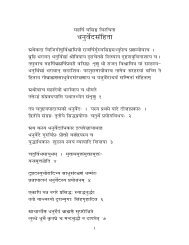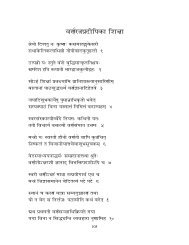You also want an ePaper? Increase the reach of your titles
YUMPU automatically turns print PDFs into web optimized ePapers that Google loves.
¦\] GD\D¬i KUHG{ LY¾DH ´DY $]D( @L¥\DVXW! Y(=\DM! V $[5P #Y $]P $] ]8²DVXWDH KUHW<br />
9.151. Let the son of the Brahmana (wife) take three shares of the (remainder of the) estate, the son of the<br />
Kshatriya two, the son of the Vaisya a share and a half, and the son of the Sudra may take one share.<br />
VY YD LU.ZMDW WG{ G][D SLUN/3\ F [0\ LY DJ NeY,5W LYL[QD $QHQ [P5LYW<br />
9.152. Or let him who knows the law make ten shares of the whole estate, and justly distribute them according<br />
to the following rule:<br />
FWXUDH $]DQ KUHG{ LY¾V ¥,Q $]DQ @L¥\DVXW! Y(=\DSX¥DH KUHG{ x] $] ]8²DVXWDH KUHW<br />
9.153. The Brahmana (son) shall take four shares, son of the Kshatriya (wife) three, the son of the Vaisya shall<br />
have two parts, the son of the Sudra may take one share.<br />
\ LS 6\DW WX VW SX¥DH 3\VW SX¥DH LS YD YHW Q $L[N G]PDG{ G DW ]8²DSX¥D\ [P5W!<br />
9.154. Whether (a Brahmana) have sons or have no sons (by wives of the twice-born castes), the (heir) must,<br />
according to the law, give to the son of a Sudra (wife) no more than a tenth (part of his estate).<br />
ÂDÚ> @L¥\ LY]D ]8²DSX¥DH Q LU.Z DN{ \G{ #Y $6\ LSWD G DW WG{ #Y $6\ [Q YHW<br />
9.155. The son of a Brahmana, a Kshatriya, and a Vaisya by a Sudra (wife) receives no share of the inheritance;<br />
whatever his father may give to him, that shall be his property.<br />
VP Y>D5VX YD MDWD! VYH5<br />
SX¥D L´M1PQDP DU -\D\VH G£YD MHU¸ WUH VPP<br />
9.156. All the sons of twice-born men, born of wives of the same caste, shall equally divide the estate, after the<br />
others have given to the eldest an additional share.<br />
]8²6\ WX VY>D5 #Y Q $1\D D\D5 LY[,\WH W6\D MDWD! VP $]D! 6\XU{ \LG SX¥]W YHW<br />
9.157. For a Sudra is ordained a wife of his own caste only (and) no other; those born of her shall have equal<br />
shares, even if there be a hundred sons.<br />
SX¥DQ ´DG] \DQ $DK Q†>D 6YD\ XYDH PQX! WH D I{ E1[X GD\DGD! I{ $GD\DG ED1[YD!<br />
9.158. Among the twelve sons of men whom <strong>Manu</strong>, sprung from the Self-existent (Svayambhu), enumerates,<br />
six are kinsmen and heirs, and six not heirs, (but) kinsmen.<br />
$D(UV! @H¥M] F #Y G¢! N‰L¥P #Y F J8) 7S¸DH $SLY] F GD\DGD ED1[YD] F T{<br />
9.159. The legitimate son of the body, the son begotten on a wife, the son adopted, the son made, the son<br />
secretly born, and the son cast off, (are) the six heirs and kinsmen.<br />
NDQ,Q] F VKDH)] F ‘,W! SD(Q 5YV WZD 6Y\G¢] F ]D(²] F I{ $GD\DG ED1[YD!<br />
9.160. The son of an unmarried damsel, the son received with the wife, the son bought, the son begotten on a remarried<br />
woman, the son self-given, and the son of a Sudra female, (are) the six (who are) not heirs, (but)<br />
kinsmen.



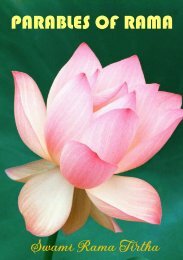
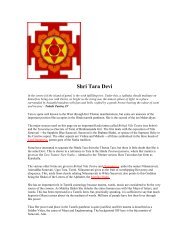
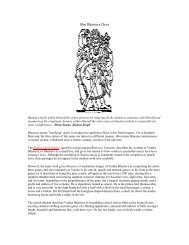
![[ Home ] [ Up ] Books Contact us Immortal Promise ... - Hindu Online](https://img.yumpu.com/9577792/1/190x245/-home-up-books-contact-us-immortal-promise-hindu-online.jpg?quality=85)
